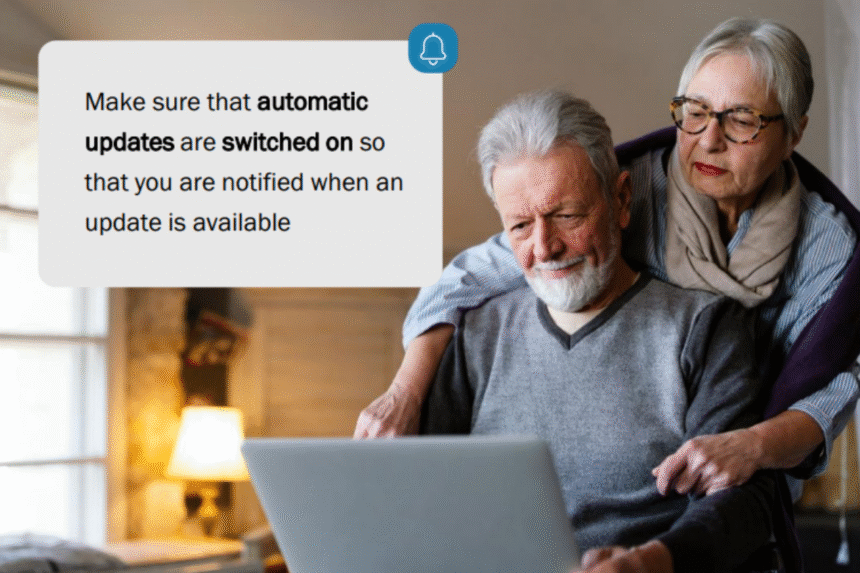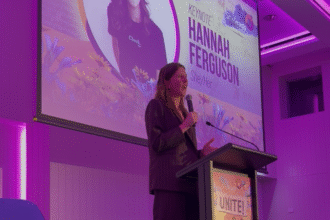If you’ve ever ignored that little pop-up asking you to update your phone, reused an old password, or clicked a link that didn’t feel quite right, you’re not alone. In today’s digital world, cyber threats are as routine as spam emails and software updates, but so too are the simple habits that keep us safe.
October marks Cyber Security Awareness Month 2025, an annual reminder that staying secure online isn’t about being tech-savvy, it’s about building everyday habits that protect you, your family, and your community.
This year’s theme, “Building Our Cyber Safe Culture,” calls on all of us to take responsibility for how we use technology. Just as we teach our kids to look both ways before crossing the road, cyber safety is fast becoming a life skill we can’t afford to overlook.
Attorney-General Tara Cheyne said the ACT Government is undertaking a range of activities throughout October to promote cyber security and support public servants to stay safe and secure online.
“The ACT Government is committed to fostering a cyber safe culture,” Attorney-General Cheyne said.
“Every public servant has a role to play in helping secure the data and systems that support the delivery of services to our community.”
That message extends beyond government, because the digital health of our city depends on all of us.
Why Cyber Security Awareness Month Matters
Canberra is a connected city. From online service portals to digital payments, our day-to-day lives rely on technology and with that comes risk. Cyber criminals are constantly evolving, using emails, text messages, fake websites and social media to trick people into revealing information or making payments.
The Australian Cyber Security Centre (ACSC) reports that one cybercrime is reported every six minutes nationwide, with losses often running into the billions. But while that statistic sounds alarming, the real takeaway is this: most cyber incidents are preventable through simple changes in behaviour.
Cyber Security Awareness Month isn’t just a campaign for IT departments; it’s a wake-up call for everyone, families, small businesses, community groups and individuals, to understand that our online actions ripple outwards.
Four Everyday Steps to Build a Cyber Safe Culture
Cyber security doesn’t need to be complicated. The ACT Government and the ACSC have outlined four key steps that anyone can take this month and they make a real difference.
1. Install All Software Updates
Why it matters:
Every update you install on your phone, tablet, or computer isn’t just about adding new emojis or a better interface. It’s about closing digital doors that cybercriminals try to sneak through. Software updates patch vulnerabilities that hackers exploit to gain access to your information.
How to do it:
- Turn on automatic updates so you don’t have to remember each time.
- Don’t delay when prompted, install updates as soon as possible.
- Make it a habit: update your apps, routers, and even smart home devices regularly.
Community impact:
Imagine if every household in Canberra kept their devices up to date, that’s thousands of potential security breaches prevented before they could even happen.
2. Use a Unique and Strong Passphrase on Every Account
Why it matters:
We all know we shouldn’t reuse passwords, yet many of us still do. A single data breach can compromise multiple accounts if you use the same login details everywhere. That’s why experts now recommend passphrases instead of passwords.
What’s a passphrase?
A passphrase is a longer, more secure version of a password, a string of random words that’s easy to remember but hard for others to guess.
How to do it:
- Make your passphrases long, at least 15 characters.
- Keep them unpredictable, use four or more unrelated words (for example, sunflower-train-river-echo).
- Make them unique, never reuse them across accounts.
- Consider using a password manager to store and generate secure passphrases.
Pro tip: Combine a strong passphrase with multi-factor authentication (MFA) for maximum protection.
3. Always Set Up Multi-Factor Authentication (MFA)
Why it matters:
MFA adds an extra layer of security beyond just a password. It requires two or more proofs of identity, like a code sent to your phone or a fingerprint scan, before granting access. This means even if someone steals your password, they still can’t log in without that second factor.
How to do it:
- Enable MFA on important accounts such as email, banking, social media, and government services.
- Use an authenticator app rather than SMS where possible for extra security.
- Set up backup codes in case you lose access to your device.
Because if someone hacks your social media account, they can impersonate you to scam friends or spread misinformation. MFA stops that in its tracks.
4. Make Cyber Safety a Daily Habit
Why it matters:
Cyber security works best when it becomes second nature. Just like locking your front door or buckling your seatbelt, these small habits protect your digital life from unnecessary risk.
How to do it:
- Be cautious with links, think before you click, especially in emails or text messages.
- Back up your data regularly to an external drive or secure cloud service.
- Be mindful of what you share online, limit personal details that could be used to guess security questions or passwords.
- Talk about cyber safety with your family and colleagues. Encourage kids to tell you if they see something suspicious online.
Every workplace, school and home has a part to play. A cyber safe culture grows when we normalise these discussions, not as fear-based lectures, but as shared learning moments.
Turning Awareness Into Action
Building a cyber safe culture isn’t just about individual effort, it’s about community. Canberra is home to thousands of small businesses, charities, and community groups that rely on digital systems but may not have dedicated IT teams.
Here’s how we can strengthen that collective safety net:
For Small Businesses
- Train staff to spot phishing emails and suspicious attachments.
- Limit admin access, only give staff the permissions they need.
- Back up your systems regularly and test your recovery process.
- Display posters or share resources from Act Now, Stay Secure to encourage ongoing vigilance.
For Families
- Use parental controls and talk about online safety early.
- Check that every family member has MFA turned on for key accounts.
- Encourage children to create fun, memorable passphrases rather than simple passwords.
- Review privacy settings on apps and gaming platforms together.
For Community Organisations
- Schedule a “cyber health check” as part of your annual planning.
- Store member or client data securely, encrypt it where possible.
- Designate one person to receive cyber updates or alerts and share them across the team.
- Incorporate cyber safety into your volunteer onboarding or training sessions.
These small, practical actions build the layers of trust and safety that make our city more resilient, online and offline.
The Bigger Picture: Cyber Resilience as Community Wellbeing
Cyber security may feel technical, but at its core it’s about protecting people. Every phishing email ignored, every account secured, every conversation about online safety, these are acts of care.
When systems go down, it’s not just data that’s at risk, it’s hospital appointments, school portals, community service records, and local business transactions. That’s why a cyber safe culture is as much a wellbeing issue as it is a technical one.
By embedding cyber awareness into everyday life, Canberra can lead the way in showing how technology and community can work together, protecting what matters most: people, trust, and connection.
This October: Make Your Pledge
Cyber Security Awareness Month isn’t about overhauling your digital life overnight. It’s about taking one step today that makes you safer tomorrow.
Try this:
- Update one device.
- Turn on MFA for one account.
- Teach one person something new about staying secure online.
Small steps, big difference.
Share your actions using #CyberMonth2025 to join the national movement and encourage others to do the same.
Because building a cyber safe culture starts with one person, one conversation, and one action at a time.
Useful Resources
- Act Now. Stay Secure: actnowstaysecure.gov.au/cybermonth2025
- Australian Cyber Security Centre: cyber.gov.au
- Turn on MFA: cyber.gov.au/mfa
- Set Secure Passphrases: cyber.gov.au/passphrases
- Update Your Devices: cyber.gov.au/update








